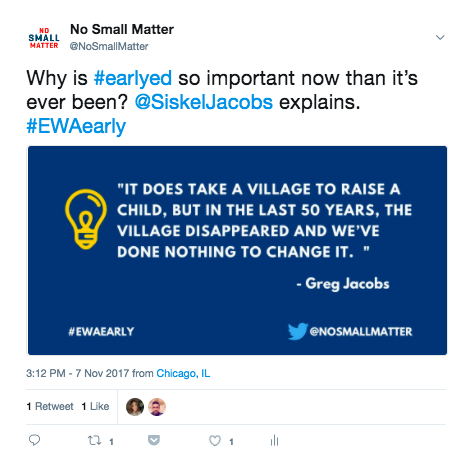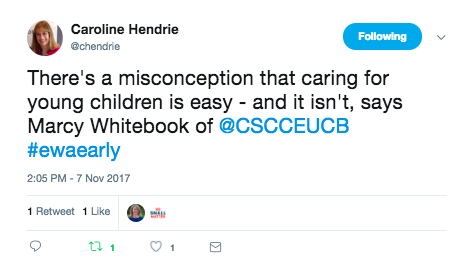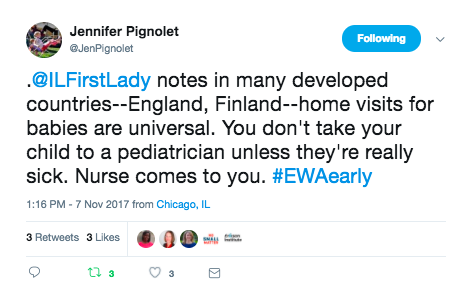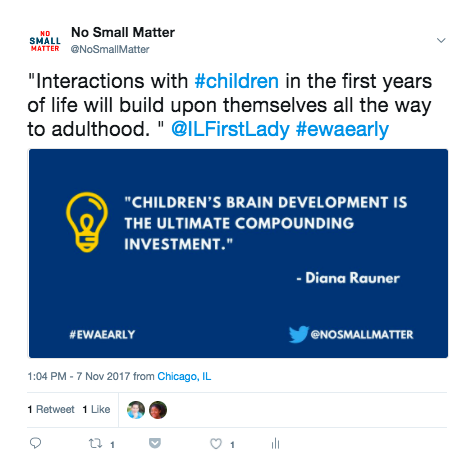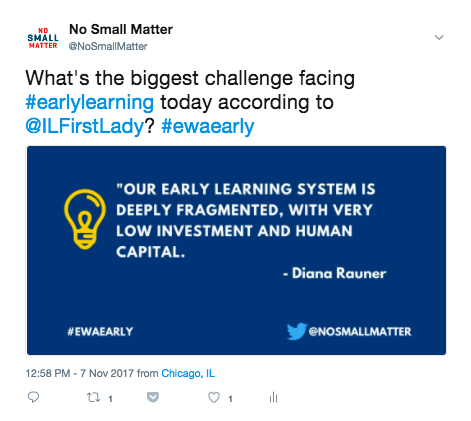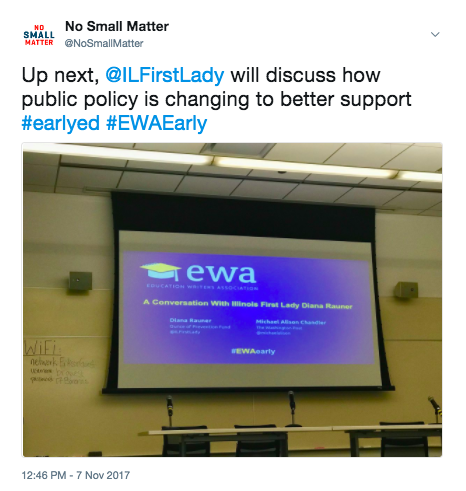Education reporters and experts nationwide gathered at Chicago’s Erikson Institute in November for a two-day seminar on early learning, hosted by the Education Writers Association. Through panels, speeches and site visits, the seminar tackled some of the most pressing issues in early learning, including federal policy and funding, the importance of home visiting, and challenges facing the childcare workforce. No Small Matter co-director Greg Jacobs also spoke at the seminar and shared potential challenges people encounter when crafting strong narratives that help elevate the importance early childhood investment.
We were able to share this information with our Twitter community by live tweeting the workshops.
Below, we picked quotes that reflect why early childhood education is one of today's pressing issues.
“Right now we don’t really have an early-learning system. Parents can’t find good care, and can’t find affordable care. ”
During a panel on tax code and federal policy, early education consultant Libby Doggett stressed that children start to learn the moment they are born, but the federal government has yet to realize that childcare and home-based care are learning settings. She said the current system, which uses the tax code to offset child care costs, doesn’t really help to build a high-quality system of early learning, and that low-income families cannot choose among nor afford the handful of high-quality programs.
“I’d like to see every baby in Illinois have at least one home visit.”
Diana Rauner, also Illinois’ First Lady, held a conversation to discuss how public policy in early learning is changing in Illinois. As president of the Ounce of Prevention Fund, she said the philosophy behind a home visiting program is simple: “the time you start parenting is when you are pregnant with your child.” Sustained home visits increase positive outcomes for children, as these interactions will help with their physical and mental health growth. However, Congress has not renewed the Maternal, Infant, and Early Childhood Home Visiting (MIECHV) Program, which provides vital services to children and families across the state. Rauner reminds us that we need to keep the pressure on them to complete the process.
“I’m not a babysitter. I’m a professional, and I should be treated as such.”
Patricia Twymon, a childcare provider from Wee are the World Daycare, which she operates from within her own home, debunked many misunderstandings about the early childhood workforce. She said that her job goes beyond just keeping kids safe and happy. “Give the kids a little time, and they’ll show you what they learned.” One of the problems facing childcare workforce, according to Twymon, is that many childcare providers are leaving because of low pay, and some are even losing their homes.
“When we push for quality issues, it can sometimes push out whoever is doing the work. ”
Rebecca Vonderlack-Navarro of Latino Policy Forum emphasized the importance of providing further education access to childcare providers. According to her research, currently Illinois has a shortage of teachers who can work with English learners, which is the fastest growing segment of students. The solution to quality programs with qualified teachers is never to push out staffers who lack degrees — rather, higher education institutions need to support adult learners to professionalize the early learning field.
“We are making an issue doc about an issue that people don’t really think of as an issue.”
Last but not least, our very own Greg Jacobs concluded the day’s seminar by presenting the ideas behind No Small Matter. Many people who still have a hard time wrapping their heads around the importance of “early learning” often assume the topic is superficial and irrelevant. In Jacobs’ own words, “why would I think someone else’s 2-year-old has an impact on my life?” But in reality, early learning involves so many fields, including economics, brain science, and psychology. It is the most powerful and most plausible policy tool to address many interlocking problems, but our childcare system has yet to catch up with this idea. No Small Matter’s goal, therefore, is to redefine the public understanding of what’s going on in children’s brain from birth to five, and push their needs to the top of the nation’s social and political agenda.
Want to learn more about early learning and how you can take actions to raise awareness of the issue? Follow us on Twitter, check out our YouTube Channel, and give our Facebook page a like to receive regular updates!


